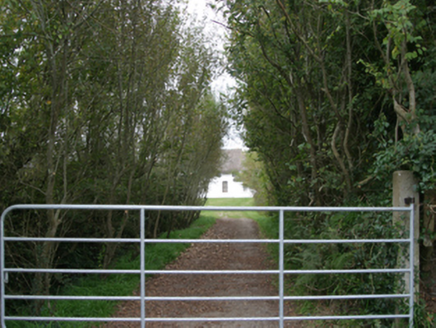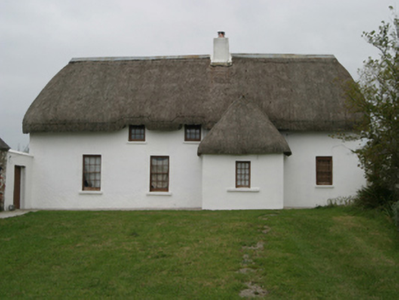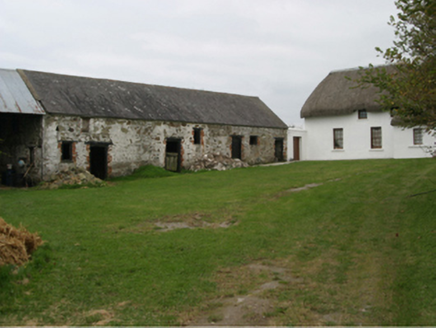Survey Data
Reg No
15705302
Rating
Regional
Categories of Special Interest
Architectural, Social
Original Use
Farm house
In Use As
Farm house
Date
1700 - 1840
Coordinates
306793, 106780
Date Recorded
25/10/2007
Date Updated
--/--/--
Description
Detached four-bay single-storey lobby entry thatched farmhouse with half-dormer attic, extant 1840, on a rectangular plan off-centred on single-bay single-storey projecting porch. Occupied, 1990. "Restored", 2000-1, to accommodate occasional use. Chicken wire-covered replacement hipped oat thatch roof with pressed iron ridge above exposed hazel stretchers to ridge having exposed scallops, cement rendered off-central chimney stack supporting terracotta pots, and exposed hazel stretchers to eaves having exposed scallops. Limewashed rendered battered walls. Square-headed off-central door opening into farmhouse. Square-headed window openings with concrete or rendered sills, and concealed dressings framing six-over-six (ground floor) or three-over-six (half-dormer attic) timber sash windows having part exposed sash boxes with six-over-six timber sash windows to side elevations. Set back from road with monolithic piers to perimeter supporting replacement tubular mild street "farm gate".
Appraisal
A farmhouse identified as an integral component of the vernacular heritage of south County Wexford by such attributes as the rectilinear lobby entry plan form off-centred on an expressed, albeit later porch; the construction in unrefined local materials displaying a pronounced battered silhouette with sections of "daub" or mud suggested by an entry in the "House and Building Return" Form of the National Census (NA 1901; NA 1911); the somewhat disproportionate bias of solid to void in the massing; and the high pitched roof showing a replenished oat thatch finish. Having been sympathetically restored following a brief period of neglect in the late twentieth century, the elementary form and massing survive intact together with substantial quantities of the original or replicated fabric, thus upholding the character or integrity of the composition. Furthermore, adjacent stable outbuildings (extant 1840) continue to contribute positively to the group and setting values of a neat self-contained ensemble making a pleasing visual statement in a sylvan street scene.





